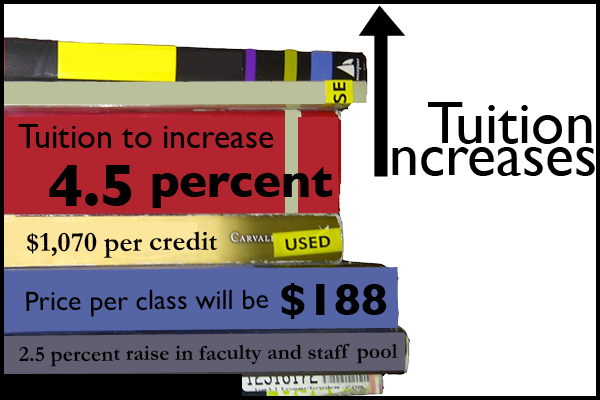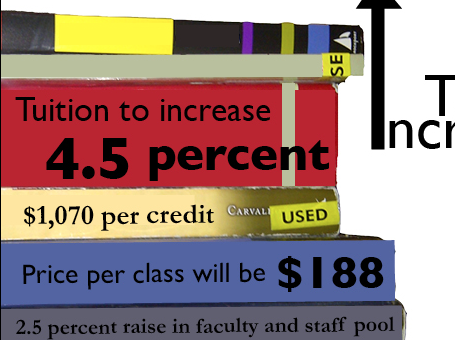
Students who consider skipping class an option might want to rethink that choice because the price per class will swell by $188 next year.
The Board of Trustees approved a 4.5 percent increase on undergraduate tuition for the 2013-2014 academic year at Thursday’s budget meeting, Doug Hennes, vice president of university and government relations said.
“We are what’s called a tuition-dependent or tuition-driven school, 73 percent of our revenue comes from graduate or undergraduate tuition,” Hennes said.
The overall comprehensive fee will increase $1,729, reaching a total of $44,294 next academic year. On-campus housing fees will rise 2 percent while boarding rates (meal plans) will increase 3 percent.
Students living off-campus will pay $35,308 for solely undergraduate tuition and fees.
Junior Josh Serre said students should be compensated for the tuition increase.
“If I get a 4.5 percent raise on scholarships, it would be fine, but nobody gets a raise on that,” Serre said. “So it’s not fair to have a raise on tuition.”
More than 80 percent of undergraduate students receive financial aid through scholarships, grants and campus employment. Students can expect the 4.5 percent increase to be reduced to 3.8 percent after financial aid.
For the most part, the rate of increase is steady, but this year’s 4.5 percent tuition increase is slightly less than last year’s 4.9 percent increase.
“Technically they say the recession is over, but we know a lot of families are still dealing with recession issues,” Hennes said. “We try to keep the tuition increases as modest as possible.”
Costs per credit at $1,070 for the 2013-2014 academic year will apply to all courses with the exception of business, computer and information sciences, statistics, and information and decision theory. Given the higher cost of faculty in these courses, classes will average $1,133 per credit.
Also included in the 2013-2014 budget is a 2.5 percent raise in the faculty and staff salary pool.
Hennes said the School of Law will not increase tuition and has room to increase the number of applications. Other graduate programs will experience increases ranging from 3 percent to 4.5 percent.
“Health care expenses go up, technology improvements go up, library expenses go up, and so we need to have revenue that covers these expenses,” Hennes said. “The overall purpose of increasing tuition is to balance the university’s budget.”
Freshman Jacey Elmer was disappointed in the tuition increase.
“It makes me sad because I’m already paying so much money to come here, and I just studied abroad and was hoping to do the same next year,” Elmer said. “This increase won’t allow me to do that any longer.”
Though some of St. Thomas’ current freshmen are dissatisfied with the tuition increase, the university plans to enroll 1,450 freshmen next year, Hennes said.
Jane Barton, a mother of a prospective student, doesn’t seem to be turned off by the tuition increases.
“I don’t think it would affect her coming here,” Barton said. “Not if the school is the right fit.”
Hennes said St. Thomas ranks seventh among 17 institutions on the Minnesota Private Colleges Council list for comprehensive fees.
“Compared to public schools, we may be more expensive, but for a private school, we are right down the middle,” Hennes said.
MPCC’s average for tuition and fees last year was $33,815, while St. Thomas charged $33,787.
“I feel pretty good about where we’re at, and how we’ve handled it again this year,” Hennes said.
Eden Checkol can be reached at chec7168@stthomas.edu.



